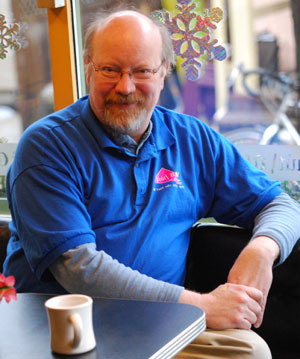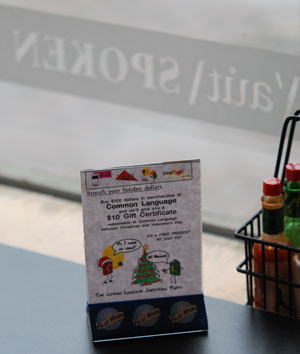Know Your DDA Board: Keith Orr

Keith Orr's tables don't wobble thanks to shims with the brand name Shove-it. It means patrons don't have to get creative with sugar packets to level out their eating and drinking surface.
People keep throwing snowballs at Keith Orr. But not in real life. They only do it on Facebook, which is a social networking website. Or at least The Chronicle witnessed no snowballs thrown in his direction at the aut BAR on Tuesday morning for the hour before it opened for lunch at 11 a.m. The Chronicle spent that hour talking to Orr about his recent appointment to the board of the Downtown Development Authority. His first board meeting was Dec. 3.
By way of background, the DDA board needs to meet certain objective criteria as a group: 1 seat for the mayor or city administrator; 1 seat for a resident of the DDA District; 7 seats for downtown property owners, downtown employees or individuals with an interest in downtown real estate, 3 seats for citizens-at-large.
Orr is a downtown property owner. With Martin Contreras, he owns the aut BAR and the Common Language Bookstore, both located in Braun Court. As we chatted at a table in the front window of the aut BAR, Orr talked a bit about the fact that he and Contreras are often mentioned as a pair, in contexts usually reserved for individuals. He gave the example of a profile done a few years ago in The Ann Arbor Observer that included them as a pair. The Chronicle could add an online example in the form of their joint entry in the People page of ArborWiki. In the BASIC computer language this fact of joint mention could be summarized as follows:
10 INPUT B$
20 IF B$ = “Keith Orr” GOTO 40
30 GOTO 50
40 LET B$ = B$ + “and Martin Contreras”
50 PRINT B$
Not that Orr would necessarily summarize it that way. But he probably could if he wanted to. He related to The Chronicle how he used to write BASIC programs back in the ’80s when he worked at Tec-Ed, a usability research and interaction design computer firm that still exists in Ann Arbor. Chronicle readers may be familiar with their ads for research subjects to test websites in the bulletin board section of The Ann Arbor News.
Orr started working at Tec-Ed right out of college as a courier and administrative support staff, then moved to writing programs in BASIC when Larry Rusinsky taught him the language. The skill set still serves Orr well: he does the website work for the aut BAR and Common Language Bookstore.
While he was at Tec-Ed, though, Orr says that wasn’t his career focus. He was a bassist with the Toledo Symphony, having started playing there in 1977 at the age of 19. His take on the Tec-Ed job as a career is reflected partly in his dislike of the Friday morning company meetings – which he generally tried to miss by strategically arranging other appointments. Like at the dentist, for example. On one occasion during the Bush Recession of 1987, Orr says he had successfully dodged the company meeting and returned to the office and noticed that the in-out board looked different. His name wasn’t on it, and neither were the names of one-third of his colleagues, who had been laid off. To be clear, the reason Orr was laid off had nothing to do with the fact that he missed the meeting, and he says there were no ill feelings towards the company. He still keeps in loose touch with Stephanie Rosenbaum, founder and president of Tec-Ed.
Unlike his colleagues who did see their jobs with the company as their careers, Orr had the alternative of his string bass. He showed The Chronicle some of his thumb and finger calluses, but says they’re nothing like they were when he was playing with the symphony. There are some chapters of Orr’s life between then and now, involving how he met Contreras and the the entry into the world of restaurant retail.
But the connection to the bass and the world of music is the one that first included him in the circle of acquaintances of the mayor of the city of Ann Arbor, John Hieftje, who makes the nominations of members to the DDA board, which then must be approved by city council. Hieftje is married to Kathryn Goodson, a classical pianist. The connection remained one of social acquaintance until policy-type interactions evolved between Orr and the mayor in connection with The Gallery project proposed at the site of the Greek Orthodox church on North Main Street. Orr, working with the Kerrytown District Association, was a party to the community effort to work with the developer to get the kind of project that the association could support.
As far as his nomination by Hieftje, Orr explained that he didn’t in any way lobby for the position. After inquiring if there was any interest a couple of years ago (which there was), Hieftje had essentially indicated to him most recently that if there was still interest, then Hieftje would nominate him to serve on the board.

Table top card featuring animated figures drawn by Orr, based on the two books featured in the Common Language Bookstore logo. The photo links to an version of the image large enough to read the speech bubbles of the characters.
It wasn’t a decision that was particularly easy for Orr. But the difficulty had nothing to do with the fact that the DDA board member that Orr would be replacing, Dave DeVarti, had indicated an interest and willingness to continue his service. (Orr and DeVarti are Facebook friends.) Orr said that the mayor’s decision not to re-appoint DeVarti wasn’t a function of his seeking DeVarti’s seat, and emphasized that the mayor didn’t ask any commitments of him while on the board, and hadn’t in any way indicated that Orr shouldn’t be a “squeaky wheel” – a description that DeVarti used to described himself on the board. In fact, said Orr, “I’m a believer in squeaky wheels!”
Asked if he had a sense of the process employed by Hieftje to arrive at a decision to nominate him or to not reappoint DeVarti, Orr said simply, “I really don’t know. It seems to be very closed.”
So why was it hard for Orr to accept a position on the DDA board? It had to do with the need to carve out some time to actually serve in that capacity. Orr said he was close to saying, “I can’t do it,” but sought out the advice of Sandi Smith, who currently serves on the DDA board and was recently elected to represent Ward 1 on city council. Orr said that Smith convinced him to go for it, and that he could have an effect on what happened in the city.
He then had to figure out what to sacrifice to make time for the board: sleep. He gets less of it. That’s partly what allowed him to meet us at the aut BAR Tuesday morning. Orr and The Chronicle wound up our conversation as the aut BAR staff started prepping the table tops for the 11 a.m. lunch hour.



